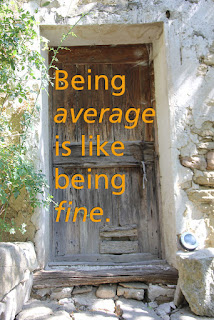"If I notice something that doesn't make sense any more, it frustrates me because why are we doing things that don't make sense any more? Why are people in pain? Why are people underutilized? Why are we disrespecting people that deserve to be respected?" Seth GodinIf we want a public education for all, we need to design it for the "ones" and not the "alls." When schools adopted Howard Gardner's theory of multiple intelligences, it was a recognition that the academic school construct of intelligence failed to include many other ways that people are "smart." It seemed a step towards recognizing individuals' strengths. Unfortunately, the myth of learning styles arising from multiple intelligences led to teachers getting their students to dance or sing or draw pictures all in the name of learning what really made one intelligent: knowing particular things--the linguistic and logical-mathematical "smarts."
Academics remain the intelligence marker. The assumption remains that there are things that all need to learn and be able to do in order to be "smart." I think we have given lip service to the idea of multiple intelligences, but have not given them value equity. How often do we lament that students should be smarter in singing or playing an instrument or showing empathy or volunteering or playing basketball or coding or graphic design or film-making or knowledge sharing or social networking or video gaming or orienteering or meditation skills?
Who determines the box of things all must know? And how will we know if "all" are learning all they need to know? Ah, yes, we will use the same measuring stick for all, which is the only fair way to compare how each is doing to the "all." Central to most classrooms is the measurement of learning--with the assumption that whatever this learning is, it can be measured. Is it poor teaching or poor learning when a student's measurement falls below average, or when the class average is too low, or even too high (test wasn't hard enough)?
If we accept that there are multiple ways of being intelligent, why are we still measuring by comparing students whether it be norm-based (individual performance compared with others) or criterion-based assessment (individuals compared against a preset standard for achievement)? Is it so we at least know whom to give awards? The idea of "average" keeps the school narrative of education for all alive, while missing all the ones. For example, based on age, students are either seen as "at,""above," or "below" the average reading level. An entire industry of books and specialists has been created to address this problem of not meeting average.
What is the damage to a personal sense of value and wholeness when a young person is told that they don't measure up to average (i.e. normal)? Our production-line model of education "for all," does indeed create a manufacturing problem down the line as some aren't ready for what they must do next. What happens when for some, our education for all becomes an education for none? One by one, the "somes" quit.
I remember a student who spoke infrequently in class (below "average") and wrote with great insight and clarity (above "average"). If I statistically average his speaking and writing skills, he is average. But when I understand that he spoke little because he would rather listen well, maybe he is "above average." Comparing and averaging simply clouds his uniqueness and the clarity I gained of his developing skills.
In our desire for a manufacturing kind of efficiency and uniformity of product, we greatly diminish the potential, possibility and diversity our schools should seek to cultivate.
Why are we still doing this?
